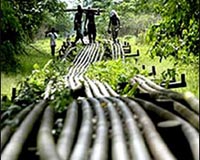 |
Washington (UPI) Aug 14, 2009 Iran's growing relationship with Venezuela may not be the biggest threat the country poses to U.S. national security interests, but U.S. officials and foreign policy experts are monitoring it closely. "There's at least enough there that it bears watching," David Myers, professor of political science at Penn State University, told a conference last week at the Center for International and Strategic Studies. Iran, under pressure from the United States and the European Union for its nuclear program and facing growing concern about its regional ambitions from the Sunni Arab states, is looking for strategic depth. In its search for partnerships beyond the region, Venezuela fits Iran's needs nicely. The two countries' presidents, Hugo Chavez of Venezuela and Mahmoud Ahmadinejad of Iran, are both populists and strong critics of the United States. During the protests in Tehran that followed the June re-election of Ahmadinejad, sparked by allegations of vote-rigging, Chavez offered his support. "Today I spoke with President Ahmadinejad of Iran. I assured him of our total solidarity as he is under attack from global capitalism," Chavez told Venezuelan TV viewers. Chavez has visited Iran seven times since 2004, and Ahmadinejad has been to Venezuela twice. Behind the bluster there is a great deal of substance. The two presidents have signed 29 agreements between the two countries. These encompass business, finance and military cooperation, and the joint investments are estimated to be worth a total of $20 billion. They include joint ventures in oil exploration, for a petrochemical and steel company and for an auto manufacturing plant in Venezuela. Poor farmers in Venezuela can now buy a tractor called the Veniran, built in the country with Iranian technical support. Last April the two countries launched a binational bank with $200 million of initial capital and a goal of $1.2 billion with each country contributing half. The bank is supposed to finance projects of mutual benefit to the two countries. It will be based in Venezuela and could offer a convenient channel for Iran to sidestep U.S.-led sanctions. In fact, sanction-busting may be a major Iranian motive for most of its deals with Venezuela. The United States is looking at tougher sanctions against Iran after the harsh crackdown on protesters after the June election. Last week the House Foreign Affairs Committee held hearings on a proposal to restrict Iran's imports of gasoline and other refined oil products. Helping Venezuela develop its oil industry could ensure an important source of supply for Iran, which lacks refinery capacity despite being a major oil producer. Joint ventures and the purchase of Venezuelan enterprises allow Iran to do business with U.S. companies and even within the United States. Myers cited the Iranian purchase of Corpbanca C.A. in May 2008 as a critical step that enabled Iran to move funds around the United States. The two countries signed a memorandum of understanding on military cooperation in April when Chavez was in Tehran building on existing relations. Iranian military advisers have been embedded with Venezuelan army units since 2006. U.S. Army field manuals that formed the basis of Venezuelan military doctrine in the past have been burned, Myers said. Asymmetric warfare as practiced by Iran's Revolutionary Guard in Iraq, and through the support of Hezbollah in Lebanon and Hamas in Gaza, is now Venezuela's official military doctrine. The Israeli government suspects that Venezuela may be supplying uranium for Iran's nuclear program, although it will not comment publicly on the matter. Venezuela has an estimated 50,000 tons of unmined uranium deposits. Iran is working with Venezuela on the development of strategic minerals. As a result Venezuela conceivably could mine uranium for Iran, according to a Carnegie Endowment report last December. Share This Article With Planet Earth
Related Links Powering The World in the 21st Century at Energy-Daily.com
 Nigerian troops withdraw from oil communities
Nigerian troops withdraw from oil communitiesLagos (AFP) Aug 14, 2009 Nigerian troops have left some of the Niger Delta oil communities they occupied last June following bloody clashes with militants, according to the region's main armed movement. "We are happy to note that the military has vacated the Gbaramatu communities to allow the displaced people return home," the Movement for the Emancipation of the Niger Delta said in a statement late Thursday. ... read more |
|
| The content herein, unless otherwise known to be public domain, are Copyright 1995-2009 - SpaceDaily. AFP and UPI Wire Stories are copyright Agence France-Presse and United Press International. ESA Portal Reports are copyright European Space Agency. All NASA sourced material is public domain. Additional copyrights may apply in whole or part to other bona fide parties. Advertising does not imply endorsement,agreement or approval of any opinions, statements or information provided by SpaceDaily on any Web page published or hosted by SpaceDaily. Privacy Statement |